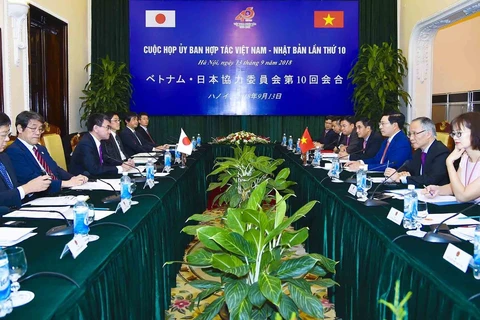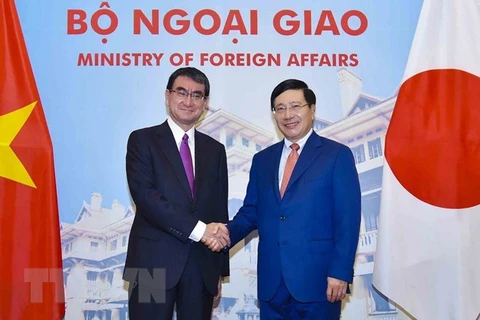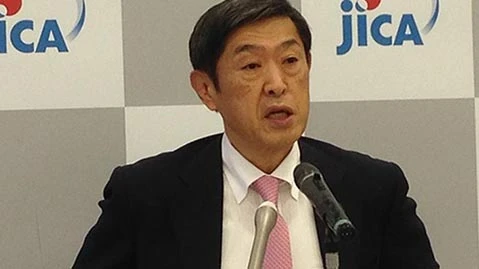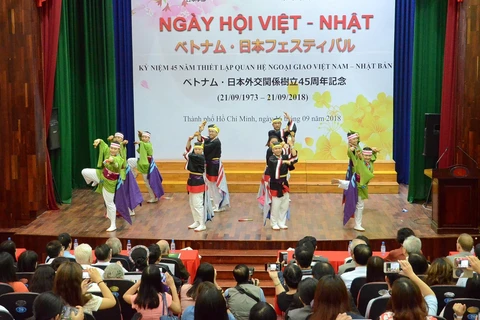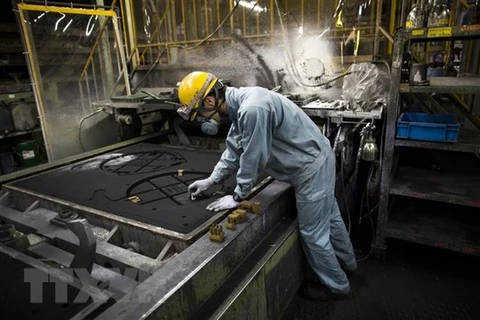 A footwear factory of the Japanese-invested Midori Safety Footwear Vietnam Co. Ltd in the Dien Nam - Dien Ngoc Industrial Park, Quang Nam province (Photo: VNA)
A footwear factory of the Japanese-invested Midori Safety Footwear Vietnam Co. Ltd in the Dien Nam - Dien Ngoc Industrial Park, Quang Nam province (Photo: VNA) Hanoi (VNA) – Professor Ryo Ikebe from the Senshu University of Japan has noted improvements in Vietnam’s economy and the two countries’ economic ties during an interview with Vietnam News Agency on the occasion of the 45 years of diplomatic relations.
Ikebe, who formerly served as chief representative of the Japan External Trade Organisation (JETRO) in Hanoi, said Vietnam was originally viewed as an agricultural exporter with strong items like rice, coffee, tea and seafood.
However, its export list has expanded to industrial products such as smartphones and automobile spare parts. Vietnam has gradually entered the group of industrial countries by exporting these products. As a result, supporting industries that manufacture components and spare parts will also be promoted to step up industrialisation, he said.
To become an exporting country, Vietnam also joined the World Trade Organisation (WTO) and the Comprehensive and Progressive Agreement for Trans-Pacific Partnership (CPTPP) while negotiating a free trade deal with the European Union.
Thanks to those efforts, Vietnam has begun to be assessed as a safe investment destination, Ikebe said, citing some investors as saying that the country’s trade policy will not change but keep pursuing liberisation.
Regarding Japan’s investment in Vietnam, he said small- and medium-sized enterprises (SMEs) of Japan are investing in the Southeast Asian nation. In the face of a falling and ageing population, a shrinking workforce and declining domestic demand, Japanese SMEs are looking for foreign markets.
In agriculture, Vietnam used to be a place of low-cost production, but Japanese firms have begun to see the country as an importer of premium fruits. Compared to 20 years ago, Japan’s investment in Vietnamese agriculture has changed, the expert noted.
Meanwhile, Japanese SMEs in the assembly industry are also paying attention to Vietnam. Many of them have entered the country to produce printer and car spare parts and components, which means they are investing in supporting industries and helping promote local industrialisation, Ikebe added.
In terms of labour cooperation, he said Vietnam has the second biggest number of apprentices in Japan, noting that they play a central role in exchanging techniques between the two countries as they apply what they have learnt in Japan in their homeland.
Techniques in supporting industries, welding, shipbuilding, food packaging, construction and agriculture are in need in Vietnam, and the country can master these techniques through overseas apprentices, the professor said.–VNA
VNA
